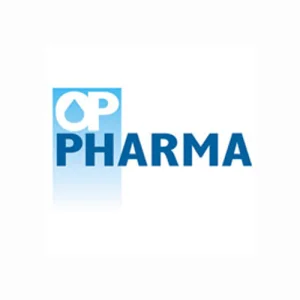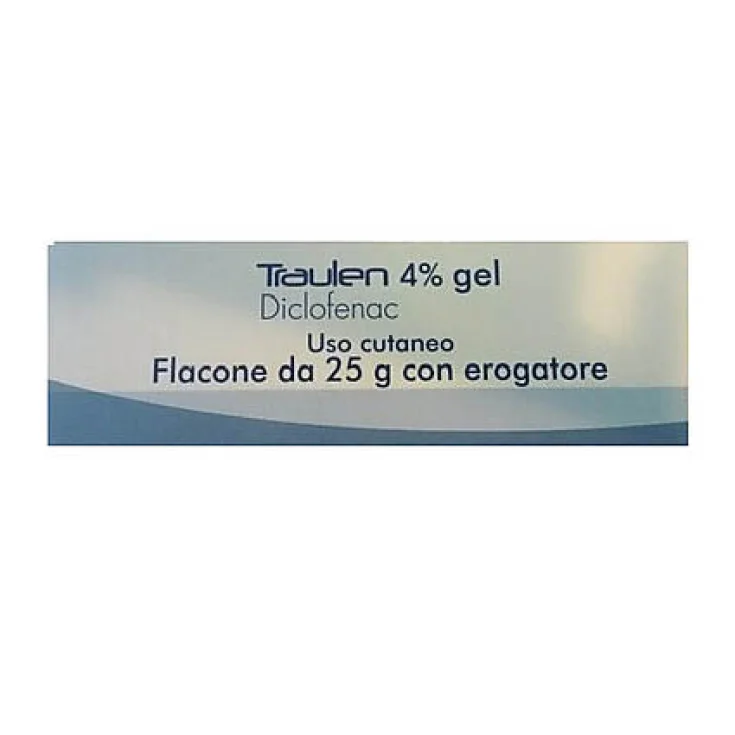Traulen 4% Painful States Treatment Gel 25g With Dispenser

- Brand: O.P. PHARMA Srl
- Product Code: 033420050
- EAN:
- Availability: In Stock (evaso in 24 ore)
- 3 items
for 14,08€ each - 4 items
for 13,80€ each - 5 items
for 13,51€ each
Traulen 4% Painful States Treatment Gel
Posology and method of use of Traulen
Traulen in Pregnancy and breastfeeding
Traulen expiration and retention
What is Traulen used for?
Traulen is used in the local treatment of painful and inflammatory conditions of a rheumatic or traumatic nature of the joints, muscles, tendons and ligaments.
Posology and method of use of Traulen
Traulen is administered according to the following doses:
- For adults over the age of 18: three to four applications, depending on the size of the area to be treated, three times a day.
- For Teenagers aged 14 to 18: three to four applications, depending on the size of the area to be treated, three times a day.
After application, wash your hands, otherwise they will also be treated with the gel. If this product is needed for more than 7 days to relieve pain or if symptoms worsen, consult a physician.
- For children below 14 years: There are insufficient data on efficacy and safety in children and adolescents below 14 years. Therefore, the use of this drug is contraindicated in children under 14 years of age.
- For the elderly: the usual dosage for adults can be used.
Traulen contraindications
The product is contraindicated in the case of:
- Hypersensitivity 'to diclofenac or to any of the excipients;
- Patients who have experienced asthma attacks, urticaria or acute rhinitis after taking acetylsalicylic acid or other non-steroidal anti-inflammatory drugs (NSAIDs);
- Third trimester of pregnancy;
- Children and adolescents under the age of 14.
Traulen Special warnings
The possibility of systemic adverse events with the application of topical diclofenac cannot be excluded if the preparation is used on large skin areas and for a prolonged period (see the summary of product characteristics of the systemic forms of diclofenac).
Therefore, particularly in patients with previous gastrointestinal diseases, the appearance of systemic side effects such as nausea, dyspepsia, heartburn, excitation, taste alteration, conjunctivitis cannot be excluded. Topical diclofenac should only be applied to intact, non-diseased skin, and not to skin wounds or open lesions. It should not be allowed to come into contact with eyes or mucous membranes and should not be ingested.
Discontinue treatment if skin rash develops after application of the product. Topical diclofenac gel contains propylene glycol which may cause mild localized skin irritation in some people. Topical diclofenac can be used with non-occlusive dressings, but should not be used with an occlusive dressing that does not allow air to pass.
External use.
Traulen in Pregnancy and breastfeeding
- Pregnancy
The systemic concentration of diclofenac, compared with oral formulations, is lower after topical administration. Referring to the experience with treatment with NSAIDs for systemic administration, the following is recommended: inhibition of prostaglandin synthesis can negatively affect pregnancy and / or embryo / fetal development. Results of epidemiological studies suggest an increased risk of miscarriage and cardiac malformation and gastroschisis after use of a prostaglandin synthesis inhibitor in early pregnancy.
The absolute risk of cardiac malformations increased from less than 1% to approximately 1.5%. The risk was believed to increase with dose and duration of therapy. In animals, administration of prostaglandin synthesis inhibitors has been shown to cause an increase in pre- and post-implantation loss and embryo-fetal mortality. Furthermore, an increased incidence of various malformations, including cardiovascular, has been reported in animals administered prostaglandin synthesis inhibitors during the organogenetic period.
During the first and second trimester of pregnancy, diclofenac should not be administered except in strictly necessary cases. If diclofenac is used by a woman attempting to conceive, or during the first and second trimester of pregnancy, the dose should be kept as low as possible and the duration of treatment as short as possible.
During the third trimester of pregnancy, all prostaglandin synthesis inhibitors can expose the fetus to: cardiopulmonary toxicity (with premature closure of the arterial duct and pulmonary hypertension); renal dysfunction, which can 'progress to renal failure with oligo-hydroamnios; the mother and the newborn, at the end of pregnancy, to: possible prolongation of the bleeding time, and antiplatelet effect which can occur even at very low doses; inhibition of uterine contractions resulting in delayed or prolonged labor. Consequently, diclofenac is contraindicated during the third trimester of pregnancy. Like other NSAIDs, diclofenac passes into breast milk in small amounts. However, no effects on the suckling child are expected at therapeutic doses of the product.
- Feeding time
Due to the lack of controlled studies in breastfeeding women, the product should only be used during breastfeeding under the advice of a healthcare professional. In this circumstance, the medicine should not be applied to the breasts of nursing mothers, nor elsewhere on large areas of skin or for an extended period of time.
Traulen expiration and retention
Check the expiration date indicated on the package. The expiry date indicated on the package refers to the product in intact packaging, correctly stored.
Warning: do not use the medicine after the expiry date indicated on the package and if not stored correctly.
Traulen composition
Traulen Gel contains:
Active ingredient: Diclofenac g 4
Excipients: propylene glycol, isopropyl alcohol, ethyl alcohol, soy lecithin, sodium phosphate dihydrate, disodium phosphate dodecahydrate, disodium edetate, ascorbyl palmitate, mint essence, purified water.
Traulen Format
Traulen Gel 4% is sold in a 25g bottle with dispenser.






